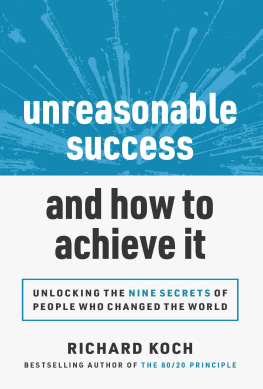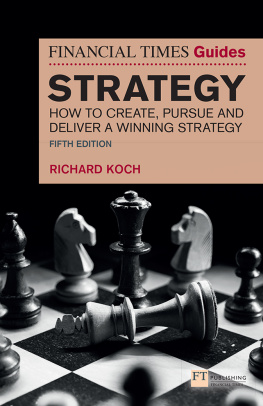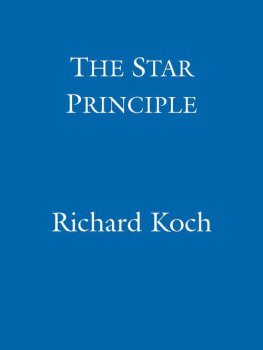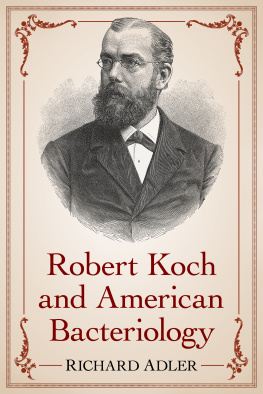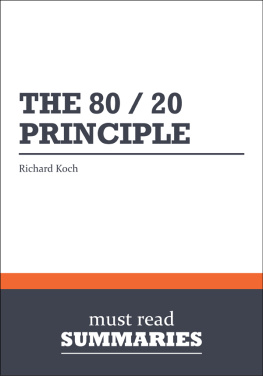Richard Koch - Unreasonable Success and How to Achieve It
Here you can read online Richard Koch - Unreasonable Success and How to Achieve It full text of the book (entire story) in english for free. Download pdf and epub, get meaning, cover and reviews about this ebook. year: 2020, publisher: Entrepreneur Press, genre: Religion. Description of the work, (preface) as well as reviews are available. Best literature library LitArk.com created for fans of good reading and offers a wide selection of genres:
Romance novel
Science fiction
Adventure
Detective
Science
History
Home and family
Prose
Art
Politics
Computer
Non-fiction
Religion
Business
Children
Humor
Choose a favorite category and find really read worthwhile books. Enjoy immersion in the world of imagination, feel the emotions of the characters or learn something new for yourself, make an fascinating discovery.
- Book:Unreasonable Success and How to Achieve It
- Author:
- Publisher:Entrepreneur Press
- Genre:
- Year:2020
- Rating:3 / 5
- Favourites:Add to favourites
- Your mark:
- 60
- 1
- 2
- 3
- 4
- 5
Unreasonable Success and How to Achieve It: summary, description and annotation
We offer to read an annotation, description, summary or preface (depends on what the author of the book "Unreasonable Success and How to Achieve It" wrote himself). If you haven't found the necessary information about the book — write in the comments, we will try to find it.
Unreasonable Success and How to Achieve It — read online for free the complete book (whole text) full work
Below is the text of the book, divided by pages. System saving the place of the last page read, allows you to conveniently read the book "Unreasonable Success and How to Achieve It" online for free, without having to search again every time where you left off. Put a bookmark, and you can go to the page where you finished reading at any time.
Font size:
Interval:
Bookmark:

Richard Koch is the author of The 80/20 Principle, which has sold more than a million copies, and been published in approximately forty languages. He is also a successful entrepreneur and investor whose ventures have included Filofax, Plymouth Gin, Belgo restaurants and Betfair, the worlds largest betting exchange. He was formerly a partner of Bain & Company, and co-founder of LEK Consulting. He has written more than twenty acclaimed books on business and ideas.
Unreasonable Success
And How To Achieve It
Unlocking the Nine Secrets of People Who Changed the World
RICHARD KOCH
Entrepreneur Press
Entrepreneur Press, Publisher
Cover Design: Andrew Welyczko
2020 by Entrepreneur Media, Inc.
All rights reserved.
Reproduction or translation of any part of this work beyond that permitted by Section 107 or 108 of the 1976 United States Copyright Act without permission of the copyright owner is unlawful. Requests for permission or further information should be addressed Entrepreneur Media Inc. Attn: Legal Department, 18061 Fitch, Irvine, CA 92614.
This publication is designed to provide accurate and authoritative information in regard to the subject matter covered. It is sold with the understanding that the publisher is not engaged in rendering legal, accounting, or other professional services. If legal advice or other expert assistance is required, the services of a competent professional person should be sought.
First published in the United Kingdom by Piatkus, an imprint of Little, Brown Book Group.
Richard Koch has asserted his right to be identified as the author of this Work.
Entrepreneur Press is a registered trademark of Entrepreneur Media, Inc.
ISBN 978-1-61308-449-6
For Jamie R, Jamie S, John, Marx, Matthew, Nicholas and Pedro, friends and principal co-conspirators on this book
Contents
PART ONE:
THE MAP OF UNREASONABLE SUCCESS
PART TWO:
THE SECRET MAP
PART THREE:
LESSONS LEARNED MY JOURNEY AND HOW YOU TOO CAN REACH UNREASONABLE SUCCESS
Bill Bain photo Boston Globe/Getty Images
Jeff Bezos photo Michael Reynold/EPS-EFE/Shutterstock
Otto von Bismarck photo BAO/imageBROKER/Shutterstock
Winston Churchill photo David Cole/Alamy Stock Photo
Marie Curie photo Pictorial Press Ltd/Alamy Stock Photo
Leonardo Da Vinci photo Chris Hellier/Alamy Stock Photo
Walt Disney photo Glasshouse Images/Alamy Stock Photo
Bob Dylan photo Pictorial Press Ltd/Alamy Stock Photo
Albert Einstein photo AP/Shutterstock
Viktor Frankl photo Ronald Zak/AP/Shutterstock
J K Rowling photo Greg Allen/Invision/AP/Shutterstock
Steve Jobs photo Kpa/ZUMA/Shutterstock
John Maynard Keynes photo AP/Shutterstock
Valdimir Lenin photo GL Archive/Alamy Stock Photo
Madonna photo Gregory Pace/Shutterstock
Nelson Mandela photo Gallo Images/Shutterstock
Paul of Tarsus painting Chronicle/Alamy Stock Photo
Helena Rubenstein photo ANL/Shutterstock
Margaret Thatcher photo Jim Hollander/EPA/Shutterstock
The future is a land of which there are no maps.
A. J. P. TAYLOR
Man cannot create the current of events. He can only float with it and steer.
OTTO VON BISMARCK
The people who are crazy enough to think they can change the world are the ones who do.
Apple Think Different commercial, 1997
unreasonable success n.
such success in changing the world, that it might seem unreasonable for any individual to have so much impact
success that is unexpected, and was not predicted when the individual was young or early in their career
success that goes well beyond what the individuals skills and performance seem to warrant
4. success based on leaps of intuition rather than on logic and reason
PART ONE
The Map of Unreasonable Success

Can We Map Success?
I n his dazzling book Outliers, Malcolm Gladwell presents a theory of outstanding success based around the early accumulation of skills the famous 10,000 hours in developing new areas of expertise. This is how Bill Gates happened to gain vast experience of computer programming long before almost anyone else. He was able to do this not just because he was obsessed with the new field, but also because privileged access to computers at school gave him a head start over his peers. The Beatles were just a mediocre high-school band in 1960 what transformed them was playing eight hours a day, seven days a week, in the strip clubs of Hamburg. We got better and got more confidence, said John Lennon. We couldnt help it, with all the experience playing all night long.
And so on. Raw talent is one thing, but circumstances enable rapid accumulation of experience; without these particular circumstances we might never have heard of The Beatles.
The trouble with this theory is not that it is wrong for the people that Gladwell cites, but that there are many more cases of extraordinary success which dont fit the template of early accumulation of experience. While I was rereading his book recently, the thought struck me what if we could map success in a way that isolates the causes of their remarkable success for almost any high achiever?
Would it be possible to construct a map of success that works for almost any eminent person in any field, at any time? Something that applies to Leonardo da Vinci, Marie Curie and Albert Einstein, Bob Dylan and Madonna, Helena Rubinstein and Steve Jobs, Paul of Tarsus and Walt Disney, John Maynard Keynes and Jeff Bezos, J. K. Rowling and Walt Disney, and even to Vladimir Lenin, Winston Churchill, Margaret Thatcher and Nelson Mandela?
Preposterous.
But this is where the idea of a map comes in. Any individuals life contains countless unique particularities. Everyones story is different. But underneath the blur of local circumstances and personal idiosyncrasies, is there a common map that successful people followed which shows the way forward? It took me a long time to find it, but I think it exists.
I started with around fifty possible landmarks experiences or reasons for success for the map, and then tried them out one by one on a small number of cases of high achievers whose life stories I knew intimately. If the explanation didnt work in nearly all cases, I discarded it.
I was surprised to find although in retrospect I should have expected this that there were a few landmarks which were so powerful that they were almost universally present. But they were not all present from the start, nor were they mainly to do with the inherent personal characteristics of the successful people. Anyone who has studied history knows well that the way individuals react to the strange, unexpected crosscurrents of events in their life greatly affects success or failure.
Successful people typically dont plan their success. Instead they develop a unique philosophy or attitude that works for them. They stumble across strategies which are short-cuts to success, and latch onto them. Events hand them opportunities they could not have anticipated. Often their peers with equal or greater talent fail while they succeed. It is too easy to attribute success to inherent, unstoppable genius. Usually this is an illusion; sometimes, a travesty of the truth.
So what excites me is this: if we can construct a useful map of success one that is based on a theory and structure and can be tested historically it becomes possible for
Next pageFont size:
Interval:
Bookmark:
Similar books «Unreasonable Success and How to Achieve It»
Look at similar books to Unreasonable Success and How to Achieve It. We have selected literature similar in name and meaning in the hope of providing readers with more options to find new, interesting, not yet read works.
Discussion, reviews of the book Unreasonable Success and How to Achieve It and just readers' own opinions. Leave your comments, write what you think about the work, its meaning or the main characters. Specify what exactly you liked and what you didn't like, and why you think so.

